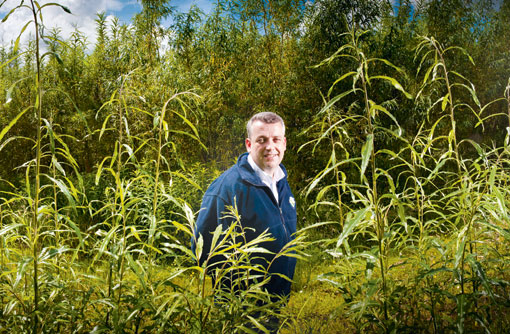FW Awards 2011: Green Energy Farmer of the Year finalist – John Gilliland

John Gilliland is a man on a mission. Over the past 20 years he has transformed the family farm from a 320ha cereal-growing enterprise into a successful renewable fuel and waste management business specialising in using willow.
He was an early adopter of renewable heat technology and passionately supports farming’s role in the fight against climate change.
Since the first Farm 2000 big bale boiler was installed in 1988 – way before the advent of renewable incentives – the family has invested £3m in renewable technologies. The Rural Generation business has been built up to provide “turnkey” renewable heat facilities to customers in Ireland, the UK, continental Europe and North America.
“Ever since we were growing cereals, it has always been my ambition to be a price maker, not a price taker, and I think we’re about there now,” he says. “It’s now about taking green energy to a new level and helping other farmers to improve the bottom line while saving the environment.”
Rural Generation has installed 140 biomass boilers and planted 3,000ha of willow for customers. Some 130ha of short rotation willow coppice is grown at Brook Hall Estate, mainly for research and development. This covers variety selection, planting techniques, nutrition, disease control, harvesting, drying, processing and the crop’s use as a biofilter. Other biomass crops have also been investigated, but none has performed as well as willow.
Many of the old farm buildings have been converted for drying and grading 3,000t of woodchip. Some 300kW of heat and 100kW of electricity is needed to dry woodchip on the farm, with all heat coming from solid biomass boilers running on waste wood and under- and over-sized woodchip from the grading process. Electricity is bought from Airtricity, but planning permission is being sought for a 250kW wind turbine close to the farm and three 3MW turbines on an outlying farm. The direct displacement of oil heat with biomass heat is saving the business 60% (£35,000) of its heat drying cost.
But it is John’s influence on others that makes him stand out. He was president of the Ulster Farmers Union in 2002-04, and in 2005 was appointed as Northern Ireland sustainable development commissioner, and chaired DEFRA‘s rural climate change forum. He has also been a HGCA board member, and is currently a non-executive director, at the Scottish Agricultural College. He was awarded an OBE for services to the environment in 2003.
A great deal of his time is spent working with and lobbying policy makers in an attempt to bring agriculture to the fore within national and European energy policy.
“I knew that if I was to be successful in seeing the proper exploitation of these kinds of technologies, then I was going to need to engage with every level of society. This has been responsible for taking me off farm, but I hope at last, to the wider industry’s benefit.”
A visitor centre was set up at the home farm in November 2006, attracting a constant flow of visitors keen to learn more about biomass energy, from school children and college students to policy makers.
There’s global ambition too. John is working with Rothamsted Research to develop willow growing in Ukraine and also a US company growing willow on abandoned land in New York State. While he is keen to share knowledge, he hopes it will ultimately bring a revenue stream back to Northern Ireland and put it on the map for “all the right reasons”.
Farm Facts
• Willow and renewable heat business
• 130ha willow coppice plus 30ha oak, poplar, sitka and gardens
• 300kW big bale boiler and 100kW KWB boiler to dry woodchip and heat large house
• Solar thermal and biomass “energy cabin” to heat gate house
The judges liked:
• Excellent communication and lobbying
• Expert technical knowledge
• Clear expansion plans
• Professionalism
• Strong R&D emphasis
